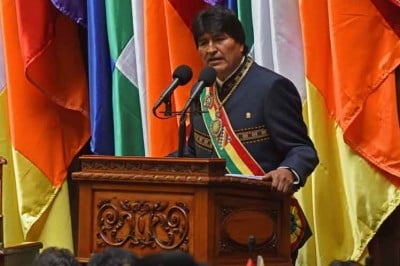Evo Morales and Eduardo Galeano in … Quebec!

As stated in a previous article in this series of five pieces on the impact of Evo-Bolivia in Canada: “No power anywhere in the world can make the people turn their anti-imperialist movement into an appendage of the Trudeau government’s foreign policy in Latin America and the Caribbean.”
That’s as true as ever.
The National Assembly is the legislative body of the province of Québec, in Canada. Québec is the only one of Canada’s provinces that possesses a national assembly as the legislature recognized by the Government of Canada.
The Québec Solidaire (QS) party was founded on February 4, 2006 in Montreal as the result of a merger of left and anti-globalization forces. Among other characteristics, such as its policies on women’s rights and the environment, QS defines itself as a party of the left and a supporter of Québec sovereignty.
On December 8, 2008, Québec Solidaire won its first seat in the National Assembly with the election of Amir Khadir to represent the Montreal riding of Mercier.
After two more elections, in 2018, the party won a major victory by adding 7 new seats for a total of 10, relegating the Parti Québecois— the old-line neoliberal sovereigntist party that formed three governments in its heyday — to non-official party status.
As a result of these developments, Québec Solidaire now has second opposition party status, behind the Liberal Party but ahead of the Parti Québecois.
At its congress on November 17, Québec Solidaire adopted the following “Urgent Resolution on Bolivia”:
“No punches can be pulled: what happened in Bolivia last week is a coup harkening back to the darkest hours in Latin American history.
“In the early 1970s, the great Uruguayan author Eduardo Galeano wrote:
“‘[Latin America] still works as a menial. It continues to exist at the service of others’ needs, as a source and reserve of oil and iron, of copper and meat, of fruit and coffee, the raw materials and foods destined for rich countries which profit more from consuming them than Latin America does from producing them.…[And so, this book] … present[s] in close proximity the caravelled conquistadors and the jet-propelled technocrats.’
“Unfortunately, those words remain as true as ever in 2019. The coup in Bolivia was planned by the Bolivian economic elite with the connivance of the Organization of American States (OAS). It should be remembered that the OAS is headquartered in Washington and that 44% of its funding comes from the United States. Simply put, the OAS is the diplomatic arm of U.S. imperialism.
“By calling into question the results of an election from which incumbent president Evo Morales emerged as the clear winner, the OAS has facilitated the taking of power by an illegitimate, deeply regressive government. Since the forced resignation of Evo Morales, the Wiphala, the seven-colored flag of the Indigenous peoples and the second official flag of Bolivia, has been removed from the presidential palace and burned in an act of brazen racism.
“With a view to denouncing this dramatic setback for democracy and human rights, Andrés Fontecilla, the member for Laurier-Dorion, and Zachary Williams, a delegate from the Verdun riding association, tabled the following urgent motion at the party congress of Québec Solidaire:
“‘Whereas:
- Bolivian president Evo Morales obtained an electoral majority in the Bolivian presidential election;
- President Morales consented to a second round of balloting, even though this was not required under Bolivian electoral law due to his majority win;
- the coup brought to power an illegitimate government in Bolivia that has fomented violence against Bolivian progressive activists and Indigenous peoples;
Be it resolved that:
-
Québec Solidaire formally denounces the coup d’état in Bolivia and the foreign interference wielded through the Organization of American States (OAS);
- Québec Solidaire denounces the far-right violence against President Evo Morales, the progressive and people’s movements, and the Indigenous communities of Bolivia.’”
But there is more. The leader of another major Canadian trade, Unifor, visited Evo in Mexico. His conclusion? It led to a powerful statement that will be dealt with in the fourth in this series of articles.
*
Note to readers: please click the share buttons above or below. Forward this article to your email lists. Crosspost on your blog site, internet forums. etc.
Originally published in the Cuban trade union central (CTC) newspaper Trabajadores in Spanish.
Arnold August is a Canadian journalist and lecturer, the author of Democracy in Cuba and the 1997–98 Elections, Cuba and Its Neighbours: Democracy in Motion and Cuba–U.S. Relations: Obama and Beyond. He collaborates with many web sites, television and radio broadcasts based in Latin America, Europe, North America and the Middle East. Twitter Facebook.

